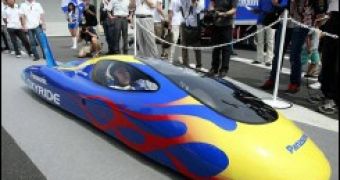There are many advocates for the cell-powered vehicles as an environmentally friendly alternative to the standard gas and other oil-based fuel burning vehicles. But others say that the market won't embrace this variant as these vehicles would be too slow.
Now, a group of Japanese students has come to prove the contrary: they ran a dry cell-powered vehicle at an average speed of 105.95 km (65.83 mi) per hour on Saturday, to make the Guinness Book of World Records. The car, powered by 192 Matsushita Oxyride AA dry-cell batteries, reached a top speed of 122.00 kph (75.81 mph) during time trial at Shirosato town in Ibaraki prefecture, 100km northeast of Tokyo in the presence of a Japanese agent for Guinness.
This is the fastest average speed reached by a dry cell-powered vehicle. The Guinness adjudicator stated he would report the achievement to his head office for its formal recognition as a world record.
The 38 kg (84 pound) vehicle is 3.3 m (10.8-ft) long, 78 cm (2.6-foot) wide and 56 cm (1.8-foot) tall and is made by students at Osaka Sangyo University with the help of Matsushita Electric Industrial Co. The materials employed for making its body are carbon fiber, reinforced plastic and a strong, light composite material.
The speed was determined twice on the vehicle's run over one km (0.6 mile) in order to eliminate any result that could have been influenced by wind and other negative factors.
Still, in April this year, the Japanese lost the world train speed record of 581kph (360.8 mph) achieved in 2003 by a Japanese magnetic levitation (Maglev) train.
A French Train a Grande Vitesse (TGV) reached 560 km (350 mi) per hour on a 73 kilometer (45.3 mile) stretch between Paris and the eastern city of Strasbourg. The new TGV also had surpassed a 17-year-old record of 515.3 km (320.2 mi) per hour, set by an elder version of the TGV.

 14 DAY TRIAL //
14 DAY TRIAL //